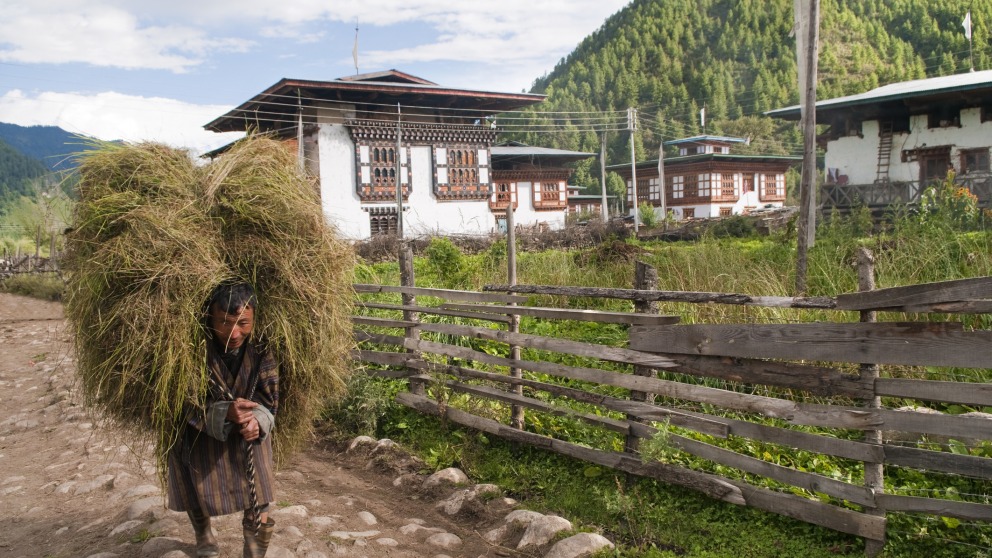Headline:
Environmental Sustainability: A Bhutanese Expression

As a child, I lived near the forests and walked everywhere on foot because we did not have motorable roads, nor could my parents afford to buy a family car. If I were to narrate this story to sociologists or media reporters, then I would feel that I was exposing my limited wealth compared with people in developed countries. But when I shared my story with scientists at the IASS, I narrated it confidently, because they think that we are on the right path towards achieving the Sustainable Development Goals (SDGs). Should I then accept that Bhutanese ways of life are indeed a blessing in disguise to the Earth? The communication exchanges I had with people here convinced me that it is a blessing.
What is Bhutan to the West?
In the West, Bhutan is seen as a leader in environmental management. We are applauded for measuring our happiness by keeping our forests intact. Establishing protected areas that cover half the country seems like a miracle to the West. And when I say that we do not have pollution, they consider we are just too lucky to be living in that part of the world. We have clean water, and at least 80% of the population do not require water filters at home. It appears, to them, as though we are free of environmental problems. Hydropower provides renewable energy, and is the only source of energy in Bhutan. This statement gives Westerners a “wow” feeling; I then really felt so proud to be Bhutanese. This feeling motivated me to ask: Is Bhutan a leader in environmental management?
Bhutanese aspiration
The priority for Bhutan is development, because we aspire to have a good life like the developed countries. Personally, I feel that a person being able to buy a car is economically sound, and enables a better life than a person without a car. We dream of having fancy cars, and want to drive around skyscrapers such as those in Potsdamer Straße, in Berlin. We feel it is more elegant to eat at McDonald’s and Domino’s. We perceive that the developed world has greater happiness than the developing countries, and think it’s so perfect out there. We feel it must be so cool to walk along city streets in torn jeans. This was my idea of the developed world when I aspired to live in developed countries. But, from my environmental panorama, I no longer think that all of them are cool and fancier.
Bhutanese challenges to sustainability
We also have our own set of challenges in Bhutan. Being a small and developing country, we do not have sufficient resources to implement various activities geared towards the Sustainable Development Goals. We are forced to prioritise, and at this time the environmental sector does not receive priority funding from the government. Our scientific sector is weak, and we need to invest in improving science. Capacities need to be developed, and institutions need to be built in order to improve knowledge systems in Bhutan. There is also a gap between knowledge generators and knowledge consumers. I see the relevance of institutionalising transdisciplinary research because it can help maintain the stability of our socio-ecological systems.
There are clear linkages between the government’s plans and the SDGs. The implementation challenge for us is to spark a sense of urgency in the minds of individuals, researchers, and politicians. This will strengthen the generation of information and knowledge, and our journey, alongside the international community, in developing solutions and mitigation measures for emerging global challenges. Risk assessment of our hydropower plants should be conducted if climate change is to affect our watershed, because it is our biggest economic sector. We need to develop alternative plans to generate energy from solar and wind if our hydro power plants are not immune to climate change impacts. I get goose bumps just considering such scenarios.
A sustainability lesson for Bhutan
We have the advantage as a developing country that we can learn from the experiences of the developed countries in protecting our natural assets and in making sustainable and optimal use of them. There is so much on which to educate ourselves, concerning the need to change our mind-sets and behaviours to see fewer environmental problems. We cannot simply sit and anticipate worsening scenarios such as air pollution, loss of biodiversity resources, severe traffic jams, and crowded cities. Let’s not wait to arrive at these tipping points, because we cannot afford to witness them. We need improved education on the global environmental sustainability challenges, and to prepare ourselves. This will be crucial preparation for the sustainability of Bhutan and to achieve the SDGs.
Header image: Haa Valley, Bhutan: A farmer walks down a rural pathway carrying a load of rice stalks. He wears a gho, the traditional men's garment. © istock/leezsnow

Add new comment